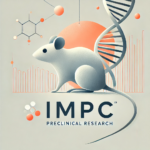A new consortium paper, IMPC impact on preclinical mouse models (Hölter, S.M. et al., Mamm Genome, 2025), highlights the importance of IMPC in biological research. The authors demonstrate how IMPC has helped illuminate the dark genome, link genes to diseases, and accelerate the development of diagnostics. To date, over 7,500 studies have leveraged IMPC data, leading to breakthroughs in drug discovery, biomarker identification, and precision medicine. Beyond its academic influence, the paper also underscores IMPC’s contributions to translational medicine. For example, the generated Prkcb knockout mice revealed PKC-beta as a potential new drug target for fatty liver disease (Shu et al. 2021) and identified that low Tgfbr2 expression are predisposed to spontaneous gastrointestinal tract tumours, making it a candidate biomarker for early colorectal cancer detection (Gough et al. 2021).
While sequencing the human and mouse genomes was a major scientific milestone, understanding gene function remained a challenge. To address these gaps in knowledge International Mouse Phenotyping Consortium (IMPC) was established to study knockout mouse models to uncover gene function and its impact on disease. Hölter, S.M. et al. emphasises that IMPC’s standardised and large-scale phenotyping has been transformative illuminating gene-disease associations and accelerating discoveries across multiple fields, including cancer, neurodegenerative disorders, metabolic diseases, and rare genetic conditions. With the availability of pre-clinical data, IMPC models have supported gene therapy development for hearing loss, blindness, ALS, mitochondrial diseases, muscular dystrophy and autoimmune conditions among others. Previous studies showed that, Sionov et al. (2015), mice with Bcl2l11 knockout exhibited premature neuronal apoptosis, making it an ideal biomarker to investigate cognitive decline in Alzheimer’s and Parkinson’s diseases.
References:
Hölter, S.M., Cacheiro, P., Smedley, D. et al. IMPC impact on preclinical mouse models. Mamm Genome (2025). https://doi.org/10.1007/s00335-025-10104-4
Shu, Yaoling, Faizule Hassan, Vincenzo Coppola, Kedryn K. Baskin, Xianlin Han, Neil K. Mehta, Michael C. Ostrowski, and Kamal D. Mehta. Hepatocyte-specific PKCβ deficiency protects against high-fat diet-induced nonalcoholic hepatic steatosis. Molecular Metabolism (2021). https://doi.org/10.1016/j.molmet.2020.101133
Gough, Nancy R., Xiyan Xiang, and Lopa Mishra. TGF-β signaling in liver, pancreas, and gastrointestinal diseases and cancer. Gastroenterology (2021). https://doi.org/10.1053/j.gastro.2021.04.064
Sionov R. Vogt, Vlahopoulos S. A., Granot Z. Regulation of Bim in Health and Disease. Oncotarget (2015). https://doi.org/10.18632/oncotarget.5492

